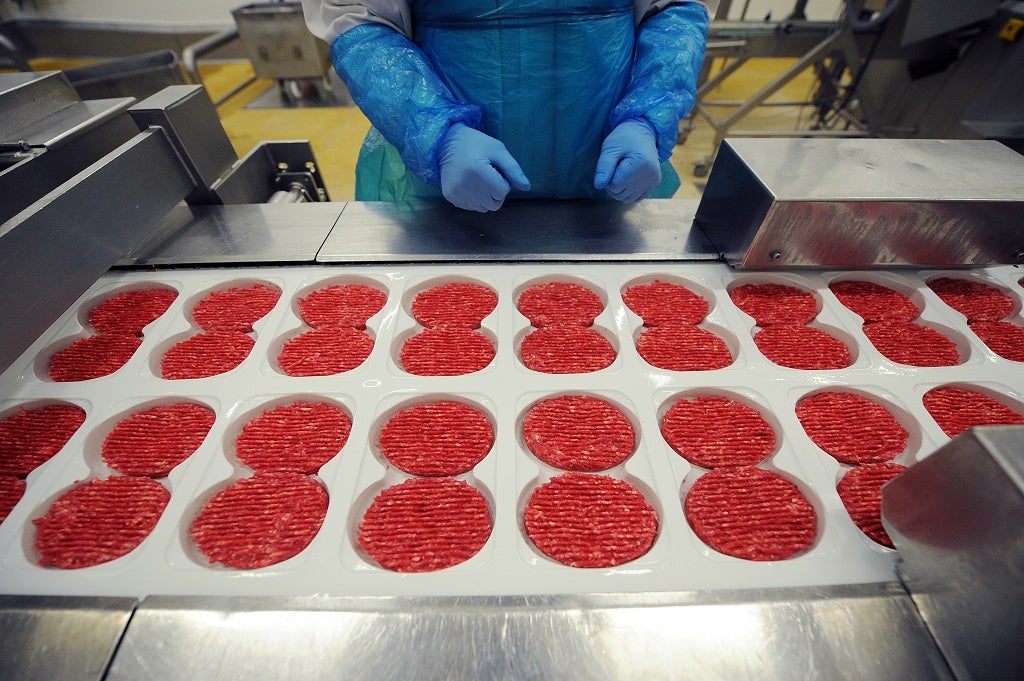What's so scary about a vegetarian future?
Scientists predict that global diets will need to change dramatically within the next 40 years to avoid catastrophic food shortages.

Your support helps us to tell the story
From reproductive rights to climate change to Big Tech, The Independent is on the ground when the story is developing. Whether it's investigating the financials of Elon Musk's pro-Trump PAC or producing our latest documentary, 'The A Word', which shines a light on the American women fighting for reproductive rights, we know how important it is to parse out the facts from the messaging.
At such a critical moment in US history, we need reporters on the ground. Your donation allows us to keep sending journalists to speak to both sides of the story.
The Independent is trusted by Americans across the entire political spectrum. And unlike many other quality news outlets, we choose not to lock Americans out of our reporting and analysis with paywalls. We believe quality journalism should be available to everyone, paid for by those who can afford it.
Your support makes all the difference.Whatever is happening to our food? Or to our meat, to be precise. Up until now meat - fatty, grisly, chewy meat, glistening in tallow - has played a central role on our plates; it has been accessible to everyone, everywhere and at all times. There have always been juicy steaks, BBQ ribs, greasy roasts and loins of lamb to keep our bellies full and our waistlines bulging.
But times they-are-a-changin’ and meat is becoming increasingly unfashionable as we gain deeper appreciation of the range of costs associated with meat-based diets. Not only is meat a risk factor for many of our own health problems but its production is one of the major contributors to global environmental degradation, climate change, fresh water scarcity and loss of biodiversity.
Alongside these threats, there is also the small problem of our burgeoning population. By 2050 there will be another 2.5 billion mouths to feed on the planet and the traditional diet of blood and flesh will not feed them all. But if we start to be realistic about our population growth the better we can focus on the challenge of feeding everyone.
So how can we feed 9 billion people on a shrinking planet? A growing number of scientists and researchers are already taking that question seriously. A report out last month from leading water specialists issued one of the starkest warnings yet about global food supplies, stating that the world's population "may have to switch almost completely to a vegetarian diet over the next 40 years to avoid catastrophic shortages”. Meals spent gorging on succulent tender steaks, all too often taken for granted, are looking numbered then.
That almighty bastion of meat culture, McDonalds, has taken heed and spearheaded plans to open vegetarian restaurants in India. OK, Maccy D’s may well be crappy junk food but there will always be people across the world who eat crappy junk food and at least now in some quarters it will be crappy vegetarian junk food. And as the other fast food conglomerates like Burger King, KFC and Pizza Hut follow its example people will soon be eating vegetarian crap everywhere without even noticing the difference. But hey, whether it’s a Maccy D’s veggie burger, artificial meat grown in a lab or local seasonal vegetables – it’s got to be good news.
Good news for the planet, us veteran vegetarians and of course the animals. But not so good if you’re a die-hard meat-eater who can’t get by without devouring a whole corpse at every meal.
But before meat-loving readers despair perhaps you should think about what vegetarianism can offer you. Try to look beyond the next meal to the long term, and be honest about whether a vegetarian future really is as scary as it sounds. Following a vegetarian diet that is cholesterol free, bursting in cancer fighting antioxidants and low in those bad saturated fats and calories can bring you a whole host of benefits that go way beyond animal rights.
There’s no great mystery about vegetarian food: it’s delicious, nutritious, and booty-licious stuff sizzling with dividends.
And given that we are living longer, wouldn’t you prefer to enjoy those extra years in good health with a more energetic and attractive body? As meat becomes scarcer it will become prohibitively expensive, so vegetarian food could well be the only affordable food available. And if lab reared in vitro meat tastes just as textured and succulent as farm reared intensive meat too there is no good reason not to embrace the dazzling developments of today’s technology if you can’t even taste the difference.
But vegetarianism may save someone else going hungry, or claw back another species from the brink of extinction or turn climate temperature down a notch. Does it really sound all that bad?
It can be said with considerable confidence that a vegetarian future really could offer an answer to many of today’s uncertainties that affect us all - economically, socially and environmentally. As it stands the future couldn’t be gloomier. The forecasts are all the same - food instability, floods and global hunger.
Exploring the possibilities to rise to these challenges is the only way we can have a chance of addressing the uncertainties. If thinking realistically about our place in the future means contemplating a vegetarian diet that can feed everyone and make the world a place worth living in it really shouldn’t be that scary.
Join our commenting forum
Join thought-provoking conversations, follow other Independent readers and see their replies
Comments